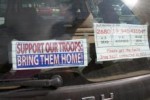Protesting War takes a different spin

When someone drives behind English adjunct professor Elizabeth Ashworth, they get a lesson on war and death.An updated body count from the Iraq war, including soldiers from the United States and Iraqi casualties, stares straight in the face of whoever happens to be in the passenger seat. And if they move their eyes just a tad to the left, they’ll be looking at a “support the troops, bring them home” sticker.
“I hope someone is sitting behind me saying, ‘Woah, I didn’t know that,” Ashworth said. ‘I hope I don’t step on too many people’s toes, but maybe they need it.”
Nearly four decades ago, John Gillen similarly felt free to voice his opposition to the Vietnam War, when he came to teach at Castleton State College — and he still feels the same way today during the Iraq War.
“We were free to have a voice in the newspaper,” Gillen said. “There was no intimidation.”
But things have changed since Gillen and other faculty and students wore black armbands at a graduation to protest the violence inflicted by the National Guard on peace demonstrators at Kent State University.
While there was nothing like the Kent State riot on Castleton grounds, there was a fair share of minor protests.
Imagine walking into Huden Dining Hall and being overcome not by the smell of hamburgers, but by 75 protesters hoping to recruit you to march with them. That happened, according to The Spartan archives. Or imagine just sitting around discussing the war with anti-war music drifting in the air around you.
“I remember people voicing their dissent, but nothing out of control,” then-student and now-professor Susan Farrell said. “No activities became destructive.”
Times have a’ changed
When the Vietnam War was raging, students at Castleton took a seat — staging a teach-in demonstration in the ballroom in the old Leavenworth Hall.
These days, Castleton students choose to ride to Washington D.C. to protest the Iraq war, rather than protest on their own lawn.
But why so little anti-war activity – even after a Castleton student was killed in Iraq?
“There is no draft, they are not immediately endangered by war,” said Jonathon Spiro, a history professor. “In the 60s, students thought they were going to die.”
By 1972 and 1973, returning veterans were leading the way in protesting the Vietnam War and some are doing the same with the Iraq War.
“When I went to Vietnam War, I originally supported the war, then I became vigorously against the war when I became part of it,” said Communication Professor Tom Conroy, who is currently teaching about war propaganda.
From music to newspapers, the 60s and 70s were immersed in the war whether people liked it or not.
“The war was much more a part of everyone’s life,” Gillen said. “It was a part of the culture thinking whether one would have to serve.”
Students like Matt Taranto say they do not feel they know enough politics to condemn or support the war, or are just sick of the coverage.
“I’m not really into politics,” student Crystal Irish said when asked for her thoughts on the war. “I don’t really watch the news.”
Spiro said people now are more cynical towards the government, Spiro said. Since the government started the war on terrorism and swept Iraq into that pact, people have been skeptical of the reasons behind the war.
“What was particular about this war was that politicians provided misleading information as the justification for the war,” said Conroy.
The number of people who identified war as America’s biggest problem was much greater during the Vietnam war, 69 percent, compared to the 27 percent surveyed in June 2004, according to the Gallup poll.
“Many people feel it’s other people’s business,” Gillen said. “They are troubled by it, but feel it’s not [their] problem.”
The recent death of student Kurt Dechen, however, made the sting of the war hurt a little more for some students.
“It made me realize how close it was,” Taranto said. “It hit home.”
Different protest styles
Even though fewer people say the war in Iraq is the nation’s biggest problem, people were protesting before it even started including a Facebook group “Am I the Only One Who Knew Iraq was a Bad Idea BEFORE the War?!?!.” Major protests of the Vietnam War, conversely, began after young men started getting drafted.
“Damn right I’d protest the draft,” student Marc Newcomb said forcefully. “Up until then, people who were fighting volunteered. It’s wrong to force people to fight.”
Not all people fear the draft, however. Student Seth Tuper recalled how his grandfather found his calling in the Army after being drafted in the Vietnam War.
“Drafting is very much an evil necessity when used correctly,” Tuper said.
And one major difference between the two wars – despite an individual’s stance on it – is the universal support for the troops. Returning soldiers aren’t being spit on when they return, but are often given a hero’s welcome.
And although the protests are fewer and smaller, and peace signs are being replaced by yellow ribbons and peace blogs, student Crystal Irish is ok with that.
She realizes that these more passive protests have not created as much of a stir as the vocal ones during Vietnam, but they still allow voices to be heard. To partake in the in-your-face protests of the Vietnam era “would cause a war among ourselves,” she said.
And some students like Tuper say protests or not, the troops really can’t be pulled out of Iraq until the job is complete.
Others like Taranto, however, believe that the government is delaying the removal of troops and is “finding reasons to go in the area longer.”
Vietnam veteran Mark Hillyer, from Poultney, simply wants an end to a war that is beginning to too closely parallel the one he fought in three decades ago, one that similarly had people wondering why we were fighting.
“We have no right to be there, we have no right to police the world,” Hillyer said. “We have to support the troops, to do everything we can to bring them out alive and well.





